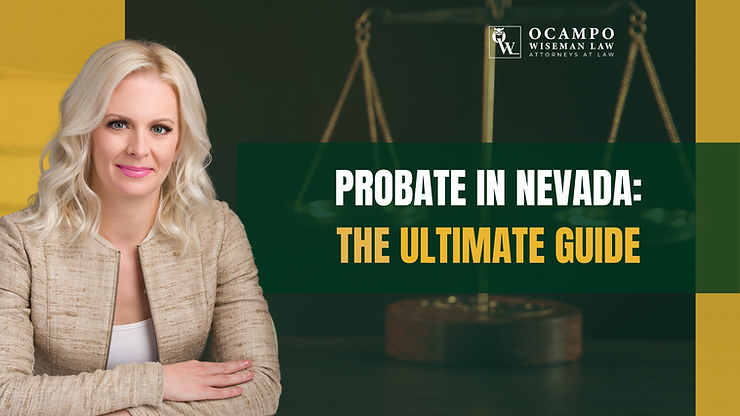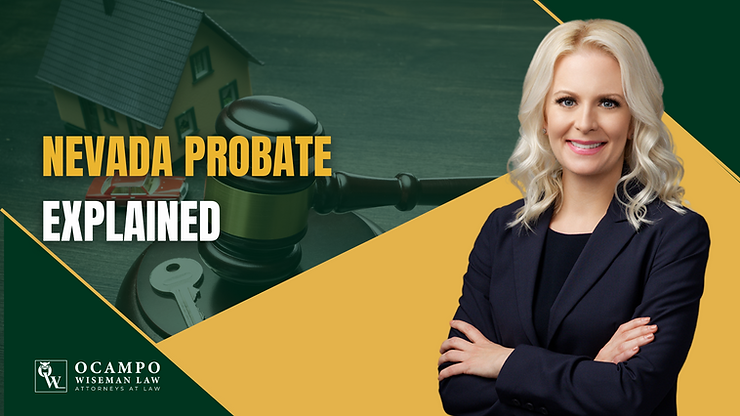The thought of untangling legal requirements while grieving can seem impossible. We at Ocampo Wiseman Law recognize the weight of this moment in your life. We are here to offer our expertise and support. Our commitment is to ensure your loved one's estate is managed with the utmost care and respect, honoring their legacy while safeguarding your peace of mind.
In this post, we'll look at the critical aspects of probate in Nevada, from determining the need for probate to understanding its various forms and how to manage or bypass this process efficiently.
Nevada Probate Explained
Probate in Nevada is a legal process through which a deceased person's assets are identified, creditors are paid balances owed, and the remaining assets are distributed to heirs or beneficiaries under the supervision of the court. This process ensures that the decedent's financial responsibilities are settled and their assets are transferred in an orderly manner.
Nevada's probate laws are structured to streamline this process, ensuring fairness and adherence to the decedent's wishes as closely as possible. These laws cater to the unique characteristics of each estate, taking into account factors such as size, complexity, and the specific directions left in a will, if any.
Roles in the Probate Process:
-
Executor/Administrator: The executor, named in the will or administrator appointed by the court in the absence of a will, plays a crucial role. They are responsible for managing the estate through the probate process. This includes inventorying assets, paying debts and taxes, and distributing the decedent's assets to the rightful beneficiaries.
-
Court Supervision: The probate court oversees the executor's actions, ensuring compliance with Nevada law and the decedent's will. The court's involvement varies depending on the probate path chosen or required based on the estate's specifics.
Is Probate Necessary in Nevada?
Whether you need to go through probate court in Nevada depends on the total value of the estate (everything the deceased owned) and the types of assets involved. Here's a breakdown of the different scenarios:
-
Estates valued at $25,00 minimal in personal property (excluding real estate): You can avoid formal probate court by using a simplified process called a Small Estate Affidavit. This affidavit allows a beneficiary, usually the surviving spouse, to collect certain assets without going through the complete probate process. It's important to note that there may be limitations on the types and value of assets you can collect with a Small Estate Affidavit. There are also certain restrictions that may apply.
-
Estates valued under $100,000: A Set Aside Petition is filed for these types of estates. There is generally one court hearing and the court sets aside the estate to the rightful heirs following the hearing.
-
Estates valued between $100,000 and $300,000: Summary Administration is a faster and more affordable option than General Administration. In a Summary Administration, the first step is to file a petition with the court to appoint an administrator. Still, it generally has less complex procedures and takes less time than General Administration.
-
Estates valued over $300,000: General Administration is required for estates valued over $300,000.00. This is the most complex and time-consuming type of probate, involving additional statutory requirements.
Starting Probate in Nevada: A Quick Guide
-
Secure the Death Certificate: This is essential for legal processes and notifications.
-
Find and File the Will: Locate the original will to identify the executor and the intended distribution of assets.
-
File the Initial Petition: The designated executor or a close relative should petition the Nevada probate court to begin the probate proceedings.
-
Notify Stakeholders: Inform heirs and creditors about the probate to allow them to present any claims or objections.
-
Inventory Assets and Appraise Values: List all assets and, if necessary, get appraisals to determine their value.
-
Settle Debts and Taxes: Pay off debts and taxes from the estate's assets before distributing the remainder.
-
Distribute Assets: Once debts are cleared, distribute the remaining estate to the rightful beneficiaries as per the will or state laws if there's no will.
Please note that a probate attorney should be used for all steps except step number 1 and part of step number 2. This streamlined approach ensures that the estate is managed and distributed correctly, adhering to the law.
Probate in Nevada does ensure a lawful distribution of assets, but it's not without drawbacks. The process can be lengthy, taking months or even a year or more, adding stress to grieving families. It can also be expensive due to court fees, attorney involvement, and executor compensation. Privacy concerns also arise as probate records are public. Finally, probate can trigger family disputes over wills or asset distribution. Considering these downsides might encourage you to explore alternative estate planning strategies.
How to Avoid Probate in Nevada?
Given these potential drawbacks, many individuals in Nevada seek alternative methods to manage their estate distribution, aiming to bypass the probate process. Here are enhanced strategies and critical considerations for effectively avoiding probate in Nevada, ensuring your estate planning is both efficient and aligned with your wishes:
Designated Beneficiary Instruments: Direct Asset Transfer
Several financial instruments are designed to directly transfer assets to a named beneficiary upon the owner's death, effectively sidestepping the probate process. Life insurance policies, retirement accounts (such as IRAs and 401(k)s), and accounts with "payable on death" (POD) or "transfer on death" (TOD) options are some examples of assets that can be designated to beneficiaries. By doing so, you can ensure that your loved ones receive financial support promptly, giving them peace of mind.
Trusts: A Cornerstone of Estate Planning
Building trust, particularly a revocable living trust, is a powerful tool in estate planning. A professionally prepared trust allows you to transfer your assets into the trust, managed by a trustee to benefit your designated beneficiaries. Upon your passing, assets within the trust are distributed according to your instructions without the need for probate. Trusts not only offer a high degree of flexibility and control over the distribution of your assets but also provide privacy for the details of the estate, as opposed to the public nature of probate records.
Joint Ownership: Seamless Asset Transition
Holding assets in joint ownership, particularly with the right of survivorship, is a straightforward strategy to ensure assets transfer directly to the co-owner upon your death. This arrangement is common among spouses and can apply to real estate, bank accounts, and other valuable assets. It's a simple yet effective way to ensure that significant assets remain outside the probate process, facilitating immediate access for the surviving owner.
With these strategies in mind, weighing the costs associated with probate in Nevada is crucial, guiding us to make informed decisions about estate planning and management.
The Costs of Probate in Nevada: Minimizing Expenses
-
Court Fees: Filing fees for the probate petition and other court documents.
-
Executor/Administrator Fees: Compensation for the individual managing the estate, often stipulated by law or the will.
-
Attorney Fees: Legal fees for probate guidance and representation. These can vary widely based on the attorney's rates and the services required.
Minimizing probate costs can involve effective estate planning, such as utilizing non-probate transfers and simplifying the estate's structure where possible. Additionally, comparing attorney fees and services can help control costs without compromising the quality of legal support.
Nevada's probate system is designed to cater to estates of varying sizes, offering different processes to streamline estate administration. Here's a breakdown of the options available:
Small Estates: Affidavit of Entitlement
-
For estates under $25,000 without real estate, Beneficiaries can claim assets using a straightforward affidavit, making it a quick and simple process.
Estates Under $100,000: Set Aside without Administration
-
Avoiding complete probate: This option simplifies the procedure for estates valued at less than $100,000, helping to bypass the more extensive probate process.
Mid-sized Estates: Summary Administration
-
Estates between $100,000 and $300,000: This process is tailored to make probate smoother and less complex for estates within this value range.
Larger Estates: General Administration
-
For estates over $300,000: The complete probate process is required, encompassing all legal formalities to ensure a thorough review and distribution of the estate.
Knowing which probate approach applies to your situation is critical to efficiently managing the estate administration process.
Nevada's Intestacy Laws: When There's No Will 
-
If the deceased is survived by a spouse but no children, parents, or siblings, the spouse inherits everything.
-
If there are surviving children, the spouse inherits the community property and the separate property is split between the spouse and 1 child. If there is more than 1 child then it is split as follows: ⅓ to spouse and ⅔ to children.
-
If there are no surviving spouses or children, assets go to the parents if they are alive and if not, then the siblings and down the line according to Nevada's succession hierarchy.
-
Marital status and the presence of children, parents, or other relatives significantly impact how an estate is distributed. Nevada law also recognizes half-relatives and gives them the same inheritance rights as whole relatives.
Understanding these rules highlights the importance of having a will to make sure your assets are passed on according to your wishes.
Estate Closure: Finalizing the Probate Process
Finalizing the probate process in Nevada involves several key steps. After all outstanding debts, taxes, and expenses have been paid, the executor or administrator must prepare and file final accounts with the probate court. This accounting details all financial transactions made on behalf of the estate. After approval by the court, the executor or administrator can proceed with handing over the remaining possessions to the rightful inheritors as stated in the will or according to Nevada's intestate succession laws. The final step is obtaining a discharge from the court, officially releasing them from their duties. This marks the formal closure of the estate.
Common Questions about Probate in Nevada
-
How is legal title transferred? Transferring legal title to assets takes place after the probate process is complete, following the court's approval via court order.
-
What is the role of the executor? The executor, appointed by the will or the court, is responsible for managing the estate's affairs. Responsibilities include paying debts and liquidating assets.
The Impact of Taxes on Probate in Nevada
Taxes can significantly affect the probate process in Nevada, including estate taxes, inheritance taxes, and income taxes on inherited IRAs and retirement accounts. While Nevada does not impose its own estate or inheritance tax, federal estate taxes may apply to larger estates. Additionally, beneficiaries may owe income tax on certain inherited assets. Planning with the help of our knowledgeable estate attorney can minimize tax liabilities for the estate and its beneficiaries, ensuring more of the decedent's assets are distributed to their loved ones. Strategies include setting up trusts, making charitable donations, and efficiently distributing retirement accounts.
Probate Disputes and Resolutions
Disputes during the probate process can arise for various reasons, such as disagreements over the will's validity, accusations of executor misconduct, or conflicts among heirs. Resolving these disputes can be approached through:
-
Mediation: An impartial mediator helps the parties reach a voluntary agreement.
-
Litigation: If mediation fails, disputes may have to go to court, where a judge makes a binding decision.
The choice between mediation and litigation depends on the complexity of the dispute and whether the parties are willing to compromise.
The Value of a Probate Attorney
The probate process can be complex, especially during a time of grief. A probate attorney provides invaluable assistance by:
-
Offering Expertise: Probate attorneys understand the intricacies of probate law in Nevada and can navigate the legal system efficiently.
-
Simplifying the Process: They can handle paperwork, court filings, and communications with creditors and heirs, relieving stress from the executor or family members.
-
Resolving Disputes: Attorneys can mediate conflicts among heirs or between heirs and the executor and represent the estate in court if necessary.
Engaging a probate attorney ensures that the probate process is managed correctly and following Nevada law, providing peace of mind to all involved.
Get Expert Probate Assistance in Nevada with Ocampo Wiseman Law
Dealing with probate in Nevada can be challenging, involving legal steps to ensure an estate is properly managed and distributed. Understanding probate laws, identifying assets subject to probate, and exploring strategies to avoid it are crucial steps in this process. Moreover, the implications of intestate succession laws and the potential for disputes highlight the importance of precise planning and legal guidance.
Look no further if you're seeking professional legal support for probate matters in Nevada. Ocampo Wiseman Law guides you through every step, offering peace of mind and dedicated expertise. We aim to make the probate process as straightforward and stress-free as possible for you and your family.










